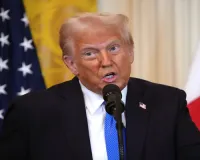Trump promises a second term focused on immigration and nationalism – as well as revenge and retribution

Today, in the Capitol Rotunda in Washington DC, the 47th President of the United States was sworn into office. The second Trump era has begun.
In his inaugural address, Trump outlined a radical agenda to reshape American life and the United States’ role in the world. As was widely predicted, Trump’s speech focused on the same things he has been focused on relentlessly for years: immigration, fossil fuels, revenge and retribution, and an aggressive “America First” nationalism – a nationalism that is rapidly morphing into naked imperialism.
While the speech itself was unremarkable – a standard Trump effort mostly indistinguishable from countless others – it marks the beginning of a second administration that will be radically different from the first.
Trump’s narrative of victimisation, his attacks on vulnerable groups and focus on his base will continue. But this time they are underpinned by a level of preparedness for action that did not exist in 2016.
On immigration: “our sovereignty will be reclaimed”
As Trump himself noted in some unscripted remarks after he left the Rotunda, he has been talking about the “border crisis” since he first descended that golden escalator in 2015.
Trump’s (or more likely, his speechwriter’s) invocation of the Alien Enemies Act of 1798, for example, nodded to the depth of legal and historical knowledge that has been brought in, and how that knowledge will be used as a weapon against the institutions of US power.
Trump has continued to blame the United States’ woes on “illegal” immigration. In the first hours of his presidency, he promised to declare a “national emergency at our southern border” and to deploy troops.
While the new administration’s efforts to radically reshape the immigration system and engage in mass deportations will inevitably be embroiled in chaos, this second administration has learned the lessons of the first. Trump understands just how politically effective it can be to target minorities and vulnerable people, shifting blame for big structural problems onto outgroups such as immigrants or transgender people.
On climate: “drill, baby, drill”
The other emergency, as Trump outlined it today and has many times before, is one of “energy”. Trump and the powerful interests that support him have long claimed that climate action undermines US power.
By declaring a national energy “emergency”, Trump hopes to ease the way for more and faster permits for oil and gas extraction and use, despite outgoing President Joe Biden’s efforts to thwart him.
Trump has already signed an order to withdraw the US from the Paris Climate Accord for a second time. As Los Angeles continues to burn, the world can no longer hide behind US “leadership” on climate action. Trump has vacated the field – the question is, now, who will fill it?
On justice: “A mandate to completely and totally reverse a horrible betrayal”
Trump has long promised revenge and retribution for those he perceives to have wronged him, so it is no surprise this theme was prominent in his inaugural address.
He promised, again, to stop the “weaponisation” of the Department of Justice. His nominee for attorney-general, Pam Bondi, is widely expected to be an effective footsoldier in Trump’s war on institutions, enacting revenge on her boss’s behalf.
Trump will also revive “Schedule F” via executive order, which will theoretically allow him to reclassify and then fire thousands of independent public servants and replace them with lackeys across federal government agencies and departments. Officials in the Department of Justice are already being removed.
And, also as foreshadowed, he has moved quickly to pardon the January 6 insurrectionists, whom he refers to as “hostages”.
On the world: “A peacemaker and a unifier”
Trump’s version of “peace” and his promise to “stop all wars” must be understood in the context of his imperial revival. As he so clearly outlined, Trump’s “peacebuilding” is in fact the aggressive assertion of US dominance, in the Western hemisphere and beyond.
On the Panama Canal, for example, Trump was unequivocal: “We’re taking it back.”
This brazen imperialism is not limited even to this planet. Trump outlined a vision for conquering Mars, too, which he described as the “manifest destiny” of the US.
Trump is apparently content to leave that destiny in the hands of Elon Musk, whose invocation of “the future of civilisation” (alongside not one but two apparent Nazi-style salutes during the ceremony) leaves no doubt as to the nature of these aspirations.
Now officially US president, Trump has outlined his radical vision for the country and the world. While there is no coherent strategy behind that vision, its aims are clear. Trump and his allies seek to build a new “golden age” for their particular version of America – an America that is radical, aggressive and unforgiving. That America might well be, as Trump claimed, “far more exceptional than ever before”. (The Conversation) AMS






